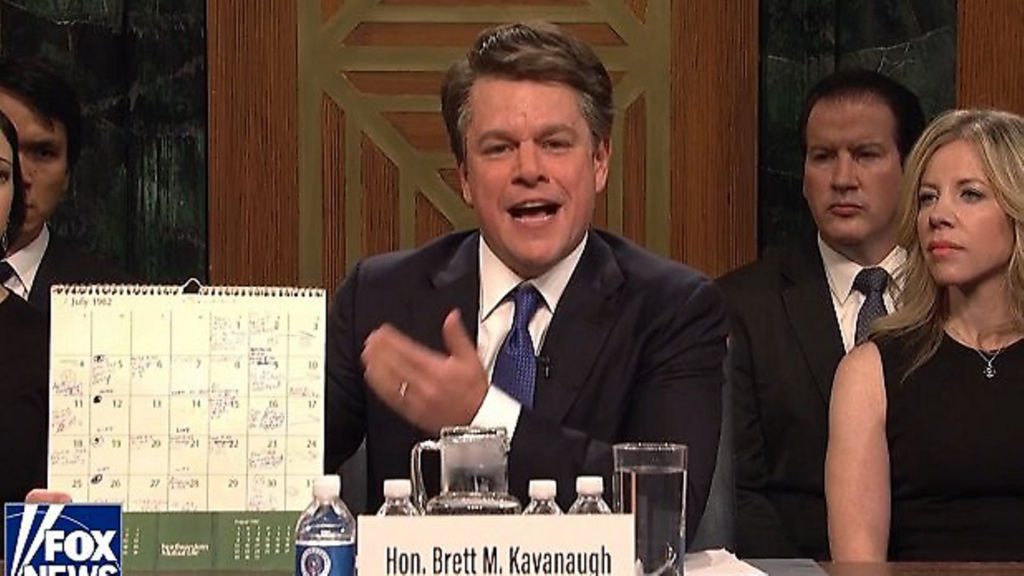
You don’t obstruct an investigation which you will believe will clear your name, says MITCH BENN

I’ve just finished watching the ‘cold open’ to the last edition of Saturday Night Live. The ‘cold open’ is a pre-opening credits sketch which, in the Trump era especially, usually takes the form of a political vignette, making satirical reference to a given event from the previous week, or, if the event itself was televised, recreating it as closely as possible.
This week it re-enacted the bizarre testimony given by Supreme Court hopeful Judge Brett Kavanaugh to the Senate Judiciary Committee; in the current SNL tradition of roping in movie stars to cameo as political figures, Judge Kavanaugh was played by a bewigged and tearful Matt Damon, who on the strength of this performance really should be doing more comedy.
As with the now-legendary sketches from a decade ago (a decade? Blimey) in which Tina Fey portrayed Sarah Palin, the funniest bits of the piece are those which stick most closely to the source material. In the sketch parodying Palin’s dreadful one-on-one interview with Katie Couric, Fey famously got the biggest laugh by merely repeating one of Palin’s rambling answers verbatim. In this new sketch, Kavanaugh’s petulant response to Senator Amy Klobuchar’s question as to whether he’d ever drunk so much in high school as to suffer memory loss (‘Have YOU?’) similarly survives unaltered.
Watching the original news coverage of the actual hearing, the most telling moment for me was not the judge’s red-faced fury (I think he was going for righteous indignation) at having to face what must be, whether he’s innocent of them or not, hideously uncomfortable accusations, but rather his squirming obfuscation when Democratic senators pointed out, one after the other, that surely the best way to meet – and, if possible, refute – those accusations would have been to insist on a full, unfettered FBI investigation into the alleged incident.
Obviously he couldn’t say he didn’t want such an investigation, so he kept ducking the question with replies along the lines of ‘I’m willing to do whatever the committee recommends’, knowing full well that the Republican-controlled committee would never ask for such an investigation.
I don’t know what did or didn’t happen at that party in 1982 (and indeed if Kavanaugh’s school friend and alleged co-assailant Mark Judge’s writings about their teenage years is to be believed, the judge probably doesn’t remember himself) but this evasion did not help him convey wounded innocence. You don’t obstruct an investigation which you believe will clear your name. You don’t duck out of an exam you’ve studied for and expect to pass. You don’t do all your homework then tell the teacher you left it on the bus.
Nor indeed do you avoid calling a referendum you think you’re going to win.
The ‘It’s the will of the people’ argument has become ever more central to the (dwindling ranks of) unrepentant Brexiteers’ case, as let’s face it, it’s all they have left. Nobody is claiming that the country will benefit from Brexit in the short or even intermediate term; the insoluble glitches such as Northern Ireland and Dover freight inspections are turning out to be every bit as insoluble as when they were first flagged up; the prime minister is still waving the already-dismissed-by-everyone-else Chequers deal like Chamberlain’s piece of paper (if the piece of paper in question were both completely blank and on fire); and the Tory high command is resorting to making crass analogies between the EU and the Soviet Union in a desperate attempt to convince the public that the decades of suffering they’re about to inflict upon us will actually be a blessed relief from the crushing oppression and famine we hadn’t noticed we were already toiling under.
Yes it’s going to suck, say the Brexiteers, but what can you do? It’s the ‘will of the people’. But is it?
Here’s something you can try, next time you’re going a few rhetorical rounds with a zealous Leaver. Ask them this question: Do you believe that there’s still a majority in favour of leaving the EU?
Because here’s the thing; wherever someone stands on that question, if they’re sincere in their position, they should be in favour of a vote on the final deal.
If you’re a Remainer, a final vote deal is in your interest, whether you believe you’d win it or not. If you think the tide has turned and an ‘option to remain’ would win, then obviously you’d jump at the chance of averting this madness. Even if you were pessimistic about this, it’d be worth having the vote just for the chance of being proven wrong.
If you’re pro-Brexit and you believe the majority is still on your side, then you should be clamouring for a vote, if only to shut the Remoaners up. However convinced you are of the validity of the 2016 result, even the most cloistered Brexiteers will be aware that the result has been heavily disputed on a number of grounds; if Brexit were to go ahead, far better to settle the matter once and for all before proceeding, surely…?
The only reason to object to a final deal vote would be if you were pro-Brexit and believed that Remain would win such a vote. In other words, the only reason to continue to brandish the 52/48 result and proclaim yourself a champion of the ‘will of the people’ would be the fact that you knew it wasn’t the will of the people any more.
They can’t have it both ways. If the will of the people is still to leave, a vote would reaffirm this. If you think a vote would not reaffirm this, then you accept that Brexit is no longer the ‘will of the people’.
You can be pro-democracy or against a final deal vote. Not both. Try it. I haven’t had one come up with a decent answer yet.
We’re winning. Stay deeply unhelpful. Resist.










